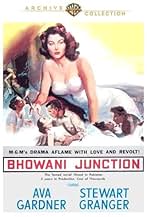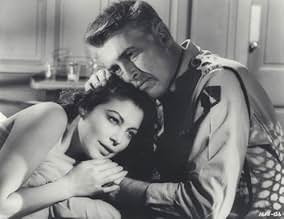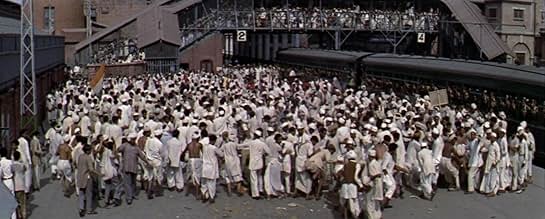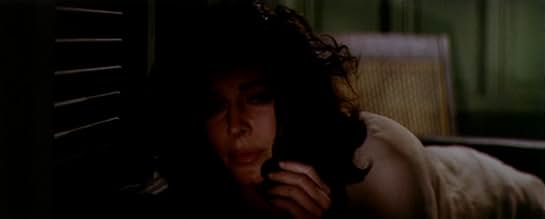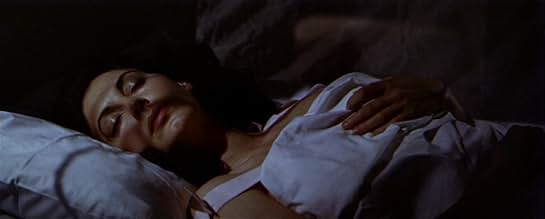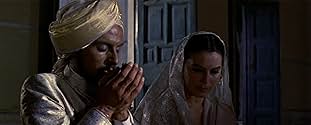IMDb RATING
6.4/10
2.2K
YOUR RATING
Anglo-Indian Victoria Jones seeks her true identity amid the chaos of the British withdrawal from India.Anglo-Indian Victoria Jones seeks her true identity amid the chaos of the British withdrawal from India.Anglo-Indian Victoria Jones seeks her true identity amid the chaos of the British withdrawal from India.
- Director
- Writers
- Stars
- Nominated for 1 BAFTA Award
- 2 nominations total
Ronald Adam
- General Ackerby
- (uncredited)
Anthony Bushell
- Lanson
- (uncredited)
Eric Corrie
- Man-at-Arms
- (uncredited)
George Cukor
- Man on Train
- (uncredited)
Roger Delgado
- Train Driver
- (uncredited)
Dharma Emmanuel
- Sentry
- (uncredited)
Raymond Francis
- Captain Cumberly
- (uncredited)
- Director
- Writers
- All cast & crew
- Production, box office & more at IMDbPro
Featured reviews
This is a beautifully shot, and well acted movie. It is almost faithful to the book and a good portrait of the chaos at the end of the second world war. Ava Gardner is luminous as always, and Stewart Granger a good foil for her.
The epic "Bhowani Junction" took two years in production (1954-55) including the location shooting in Lahore, Pakistan. It is a great melodrama that circumvents the tumultuous times and events unfolding Sub-continent's partition and the socio-political upheaval associated with it.
The perplexed minds and characters of Anglo Indians filled with angst were the signs of those turbulent times as the British pack up for their home country in the aftermath of India's partition and Independence. Ava Gardner as Victoria Jones has outperformed in all facets of her central character in the movie, as she perfectly translates her persona and body language which is in complete sync with the abnormal circumstances taking new twists and turns of fate with every passing day. Stewart Granger as Col. Rodney Savage is equally superb in his majestically mature performance who takes hold of a crisis like situation on Bhowani Junction (shot on actual location of gigantic Lahore Railway station) with wisdom, sagacity and the grit to out maneuver the machinations of Hindu rebels or trouble makers. That were trying times and the British colonialists had to deal with unusual challenging situations.
The screenplay and direction by George Cukor speaks for itself and I personally feel that this gem of a movie is underrated and unfortunately did not do a roaring business on the box office, but for all the glory that was Hollywood during that golden era of cinema, Bhowani Junction presents a complete feature film coupled with cinema-scope colour production, evocative musical score composed by Miklos Rozsa,thoughtful direction, superb cast and wonderful acting skills of those classic actors of a bygone age. (Ten out of ten). A must see for serious viewers.
The perplexed minds and characters of Anglo Indians filled with angst were the signs of those turbulent times as the British pack up for their home country in the aftermath of India's partition and Independence. Ava Gardner as Victoria Jones has outperformed in all facets of her central character in the movie, as she perfectly translates her persona and body language which is in complete sync with the abnormal circumstances taking new twists and turns of fate with every passing day. Stewart Granger as Col. Rodney Savage is equally superb in his majestically mature performance who takes hold of a crisis like situation on Bhowani Junction (shot on actual location of gigantic Lahore Railway station) with wisdom, sagacity and the grit to out maneuver the machinations of Hindu rebels or trouble makers. That were trying times and the British colonialists had to deal with unusual challenging situations.
The screenplay and direction by George Cukor speaks for itself and I personally feel that this gem of a movie is underrated and unfortunately did not do a roaring business on the box office, but for all the glory that was Hollywood during that golden era of cinema, Bhowani Junction presents a complete feature film coupled with cinema-scope colour production, evocative musical score composed by Miklos Rozsa,thoughtful direction, superb cast and wonderful acting skills of those classic actors of a bygone age. (Ten out of ten). A must see for serious viewers.
Well, I've always sort of identified myself as an AngloBanglo.
My dad was born in Lahore in 1929 and my grandparents left Karachi in 1965 almost 20 years after partition because the Muslims had made it impossible for my Nana to continue to run her private school.
The returned to England like so many AngloBanglos where they were too Indian for the white and not Indian enough for the Indians.
Just like they were back in what was then Pakistan and by some account, India itself.
You have to remember that at this point, as depicted in the film, 1947 was the cusp of partition and violence was everywhere. My grandfather told me graphic stories of entire trains of people slaughtered he had witnessed.
Ava Gardner's character has to choose which side she is on but for many AngloBanglos the struggle goes on. We are neither brown enough for the browns, nor white enough for the whites. I now live in Canada but I self identify as English.
The sub text in George Cukor's story has lost some of it's impact over time because few remember the upheaval of partition but for some of us, it bring it back into focus.
More interesting to me is that it was released the year I was born, in England, in 1956.
My dad was born in Lahore in 1929 and my grandparents left Karachi in 1965 almost 20 years after partition because the Muslims had made it impossible for my Nana to continue to run her private school.
The returned to England like so many AngloBanglos where they were too Indian for the white and not Indian enough for the Indians.
Just like they were back in what was then Pakistan and by some account, India itself.
You have to remember that at this point, as depicted in the film, 1947 was the cusp of partition and violence was everywhere. My grandfather told me graphic stories of entire trains of people slaughtered he had witnessed.
Ava Gardner's character has to choose which side she is on but for many AngloBanglos the struggle goes on. We are neither brown enough for the browns, nor white enough for the whites. I now live in Canada but I self identify as English.
The sub text in George Cukor's story has lost some of it's impact over time because few remember the upheaval of partition but for some of us, it bring it back into focus.
More interesting to me is that it was released the year I was born, in England, in 1956.
The setting for Bhowani Junction is India during the last days of the British Raj. The town of Bhowani is a railroad junction and both the Congress Party and the Communist Party are doing all kinds of sabotage to help the British quickly get out of India. Of course each is doing it for their own reasons.
Two people who may have given the outstanding performances of their careers are Ava Gardner and Bill Travers. Both play bi-racial people who don't fit in either society. But they react differently. Gardner is going through a whole lot of angst, really seeing both the British and Indian point of view. How she missed an Oscar nomination here is beyond me.
Bill Travers is the railroad station manager and his whole life is his job. He focuses narrowly on that and his tunnel vision leaves him oblivious to the momentous changes around him. Except for the fact that when the British leave he might lose that little piece of authority where he is, that which gives him stature in the Raj society.
The issues are complex, but in the hands of a great director like George Cukor the characters and their struggles become real and even more important, the audience becomes interested.
Stewart Granger who was the British Colonel in charge of the whole mess in Bhowani, said that Bhowani Junction was one of the few films he was really proud to be associated with. He has a struggle to, he really does see the Indians as human beings and not just "wogs." He's quite knowledgeable about their customs and at one point utilizes that knowledge to unjam that railroad terminal.
Bhowani Junction is an intelligent and literate drama and a superb piece of film making.
Two people who may have given the outstanding performances of their careers are Ava Gardner and Bill Travers. Both play bi-racial people who don't fit in either society. But they react differently. Gardner is going through a whole lot of angst, really seeing both the British and Indian point of view. How she missed an Oscar nomination here is beyond me.
Bill Travers is the railroad station manager and his whole life is his job. He focuses narrowly on that and his tunnel vision leaves him oblivious to the momentous changes around him. Except for the fact that when the British leave he might lose that little piece of authority where he is, that which gives him stature in the Raj society.
The issues are complex, but in the hands of a great director like George Cukor the characters and their struggles become real and even more important, the audience becomes interested.
Stewart Granger who was the British Colonel in charge of the whole mess in Bhowani, said that Bhowani Junction was one of the few films he was really proud to be associated with. He has a struggle to, he really does see the Indians as human beings and not just "wogs." He's quite knowledgeable about their customs and at one point utilizes that knowledge to unjam that railroad terminal.
Bhowani Junction is an intelligent and literate drama and a superb piece of film making.
During the chaotic final days of British rule in northwest India in 1947, the beautiful daughter (Gardner) of an English train engineer and an Indian mother struggles to find her identity while pursued by three men: a rail-traffic superintendent (Bill Travers), his Sikh subordinate (Francis Matthews) and a British colonel (Stewart Granger). Meanwhile Indian supporters of Mahatma Gandhi campaign for independence while Communists, led by a revolutionary called Davay (Peter Illing), fuel unrest.
"Bhowani Junction" (1956) is an exotic drama with adventure elements similar to the future "A Passage to India" (1985), although not as good as that one. It features most of the elements you'd think of when India comes to mind - never-ending throngs of people in (usually) white garb, trains, street commotion, etc.
Ava is beautiful, Granger makes for a stalwart male protagonist, the locations are authentic and the historical setting is interesting. But I rolled my eyes at the subplot regarding a certain person feeling guilty about something, which didn't make sense since what that person did was in self-defense and the perpetrator was an ignoble scumbag.
The movie runs 1 hour, 50 minutes, and was shot in Lahore, Pakistan, which is just across the border from northwestern India; the train wreck sequence was done 35 miles outside London to the southwest; another sequence was shot at Tram Tunnel, Kingsway, London, while studio stuff was done at the MGM British Studios just north of the city.
GRADE: B-/C+
"Bhowani Junction" (1956) is an exotic drama with adventure elements similar to the future "A Passage to India" (1985), although not as good as that one. It features most of the elements you'd think of when India comes to mind - never-ending throngs of people in (usually) white garb, trains, street commotion, etc.
Ava is beautiful, Granger makes for a stalwart male protagonist, the locations are authentic and the historical setting is interesting. But I rolled my eyes at the subplot regarding a certain person feeling guilty about something, which didn't make sense since what that person did was in self-defense and the perpetrator was an ignoble scumbag.
The movie runs 1 hour, 50 minutes, and was shot in Lahore, Pakistan, which is just across the border from northwestern India; the train wreck sequence was done 35 miles outside London to the southwest; another sequence was shot at Tram Tunnel, Kingsway, London, while studio stuff was done at the MGM British Studios just north of the city.
GRADE: B-/C+
Did you know
- TriviaMGM originally planned to film Bhowani Junction on location in India. That is, until the Indian government started making demands seeking script approval and a big tax payment of 12% of the film's worldwide net profit. MGM changed their plans and decided to film instead in Pakistan - whose government was more accommodating and less demanding of the studio. And this made the picture the first Hollywood film produced in that country.
- GoofsWhen Savage is first in Taylor's office giving him orders about the trains, he says, "One of you will have to be in close touch with me at all times so that my trolley patrols do not run into unscheduled trains." He says the word "unscheduled" using the American "sk" pronunciation, but as an Englishman he would have pronounced it using the British "sh" sound.
- Quotes
Victoria Jones: Why should you stand by me? You're not an Anglo-Indian?
Col. Rodney Savage: You're an officer under my command.
Victoria Jones: Say, eh, I, all these weeks I've known you, this is the first time I've realized there's a human being inside you somewhere.
Col. Rodney Savage: Oh, he's still there, is he? Good. Then, there's hope for us all.
- ConnectionsEdited into Histoire(s) du cinéma: Une histoire seule (1989)
- How long is Bhowani Junction?Powered by Alexa
Details
Box office
- Budget
- $3,637,000 (estimated)
- Gross worldwide
- $3,657
- Runtime
- 1h 50m(110 min)
- Aspect ratio
- 2.35 : 1
Contribute to this page
Suggest an edit or add missing content


